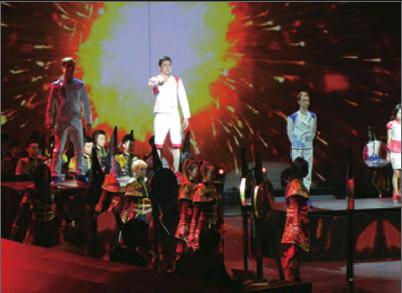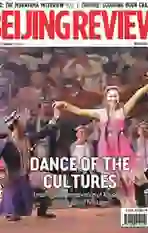The Power of Ni Hao
2015-09-06BySudeshnaSarkar
By+Sudeshna+Sarkar

‘Everyone who visits Hunan [Province] comes here,” said Xiao Yuanyuan, pointing at the serene hall of the Yuelu Academy with its inscribed walls and sylvan surroundings. In the course of her career at the Information Office of the Government of Hunan Province in central China, Xiao has personally escorted many groups of visitors to this five-star heritage site in Changsha, the provincial capital. It is the place where scholars and students flocked thousands of years ago to learn philosophy and the Chinese classics from revered masters.
The Yuelu Academy, one of Chinas four foremost ancient schools of learning, is as renowned in its own way as the Academy of Greek philosopher Plato in Athens in 387 B.C., or the school in ancient Egypts Alexandria around 306 B.C., or closer home and in time, the Nalanda school in India in the fifth century. But unlike the others, which were destroyed in the course of time, the Yuelu Academy, founded in 976 during the reign of the Song Dynasty (960-1279), is still alive, transformed into the Hunan University in 1926.
It is therefore fitting that Changsha, home to Chinas oldest surviving academic institution, plays host to an annual academic contest that is like no other educational examination today. In its 14th year, the 2015 Chinese Bridge Chinese Proficiency Competition for Foreign College Students held under the aegis of the Confucius Institute Headquarters (Hanban) and the Hunan Provincial Government has evolved into a spellbinder of a reality show that is a cross between Americas Got Talent and the British version of Big Brother combined with a dash of the Oscars.
Once, it would have been inconceivable that hundreds of young people worldwide would give up all normal pursuits for months on end and go into rigorous training for something that is essentially an academic exercise—learning Chinese, a language considered difficult to master, and learning about China, its history, geography, trade, culture and the Chinese way of life. And the prizes to be won are not the milliondollar contracts offered by the TV reality shows, or posh cars or even designer wardrobes. The winners get scholarships to study—yes, more Chinese in China. Take other academic contests, the International Math Olympiad or the U.S. Spelling Bee Contest, for instance. You do not see famous film and pop stars vying to be associated with them, youngsters staying up till midnight to cheer their favorite contestants or nubile girls clamoring to take selfies with the winners.
Star performer
Yet all this is happening at the China Bridge show. Petra Thiel, a Sinologist with the Confucius Institute at the Heidelberg University in Germany who was one of the four judges at the final in Changsha on August 2, explained what has given the event its current dynamism. “It is not just a Chinese language exercise anymore,” she said.“It is a whole package with how you perform on stage and your knowledge of day-to-day affairs in China counting as much as your proficiency in Chinese. I was stunned by the levels of some of the contestants.”This years edition saw six finalists chosen from 133 contestants from 97 countries after regional elimination rounds. The stalwarts then traveled to China, took part in group activities, visited famous Chinese sites and cities, and stayed with Chinese families for an authentic taste of the Chinese culture. The eliminations were done on the basis of their language skills as well as performances in activities as diverse as singing Chinese songs and calligraphy prowess.
These essential elements of the Chinese culture have given a makeover to the event, transforming it into a program with Chinese characteristics. The China Bridge Contest is showcasing Chinese history and art to the world, especially to the young generations, who are its future leaders.
In the final round, the six students, divided into two groups, performed two skits, both reviving historical images of China. These would have earned praise from Hollywood director James Cameron, who shot his 2009 film Avatar in Hunans Zhangjiajie National Forest Park, with their rich costumes and props and the verve displayed by the student performers. One showed 13th-century Venetian explorer Marco Polo, often called the most famous Western explorer who came to China along the ancient Silk Road, arriving at the court of Mongol Emperor Kublai Khan of the Yuan Dynasty (1271-1368).
History bears witness to the affection and honor Chinas rulers lavished on foreign visitors. Marco Polo, who was awestruck by Chinas enormous wealth and huge industries—at that time China manufactured almost 125,000 tons of iron annually, a level Europe reached only four centuries later—was appointed as a tax inspector in Yangzhou in east Chinas Jiangsu Province. He was a frequent visitor to Hangzhou in neighboring Zhejiang Province with its splendid lakes and canals that probably reminded him of his hometown. The emperor trusted Marco Polo to the extent that he entrusted 17-year-old princess Cocacine to the Venetians care to be escorted to Persia where she was to be wedded to the Persian king. It was a task Marco Polo discharged honorably, though legend says he and the princess had fallen in love with each other.
The other skit was a remarkable blend of imagination and reality, past and present. It was a vignette of a Chinese ship arriving in an African country and some of the officials giving up their positions to stay back in the foreign land for love. Such voyages led to Chinese men marrying African women, giving rise to a new Sino-African line. When the skit ended, one such actual descendant in flesh and blood appeared on stage, remembering her Chinese heritage and her fathers exhortation to her to never forget it, a reminiscence that brought a lump to the audiences collective throat.
Language envoys
Bradley Meredith, a 21-year-old from New Zealand, won this years contest by a hairs breadth. It was a sort of homecoming for the Brad Pitt-look-alike who had spent part of his childhood in China when his father was posted here on work and learned Chinese from his boyhood friends. Meredith, called Ni Dongmou in Chinese during the contest, has been a virtual ambassador of the Chinese language and culture, spreading awareness among his friends and associates. His sisters boyfriend, he said, had also taken part in the contest.
Samuel Fru Asanji, a 22-year-old from Cameroon and among the six finalists, was delighted with the results. “I am so glad Bradley won,” said Asanji who had studied the Chinese language for just 10 months and won the judges admiration for such speedy progress within such a short period of time. “New Zealand had not been among the finalists before. The first time they made it there, they hit the jackpot.”Happy for Meredith first, Asanji was glad, as an afterthought, that Cameroon had made it among the finalists for the first time. The Chinese Bridge program has done what no reality show has achieved—nurtured selflessness among the young participants and made them become one global family, thinking nothing of their own failures but drawing pleasure from each others success.
